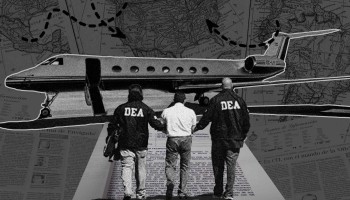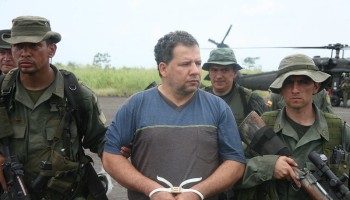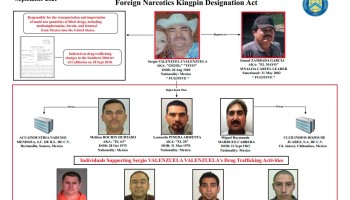Authorities said on Sunday that about 52,000 police officers and soldiers have been deployed to the most affected areas to contain the violence. Local media reported that at least 150 attacks, 12 murders and 80 destroyed buildings have been recorded.
Several Colombian cities are already experiencing a shortage in supplies as at least 50 transportation lines have been suspended. Members of the clan have been setting up barricades and have burned almost 170 vehicles. Authorities have detained 92 people.
Dairo Antonio Úsuga David, alias ‘Otoniel,’ was extradited to the U.S. to face charges of leading a continuing criminal enterprise and engaging in an international cocaine manufacturing and distribution conspiracy.
“I want to report that [Otoniel] was extradited; the most dangerous drug trafficker in the world, murderer of social leaders and police officers, abuser of children and teenagers. Today, legality, the rule of law, the public force and justice triumphed,” President Ivan Duque tweeted last week.
The U.S. had offered US$5 million for information that would lead to Otoniel’s arrest.
According to court documents, between June 2003 and October 2021, Otoniel led the criminal gang responsible for transporting tonnes of cocaine from Colombia to the U.S via Mexico and Central America.
He is also blamed for the forced displacement of entire communities, multiple murders of civilians and members of the police force, abuse of minors and illegal recruitment, said the Director General of the National Police of Colombia Jorge Luis Vargas on Twitter.
His Gulf Clan is “the most powerful paramilitary and drug trafficking organization in Colombia this century,” United States Attorney Breon Peace said. The group had fueled violence, drug abuse, and compromised quality of life in every community his cocaine shipments touched.
Otoniel was arrested in October last year in a rural area of the northwestern Uraba region in Antioquia province, near the Colombia-Panama border. The massive operation involved nearly 500 men and was supported by 22 helicopters.
Last Thursday he pleaded not guilty before a New York judge. His trial is expected to start in June.
Otoniel’s extradition was approved by a presidential decreeafter the Colombian State Council denied an appeal by several victims of his alleged crimes who wished to see him tried in a Colombian court. The Council believed that the extradition wouldn’t stop the criminal investigations in Colombia from continuing.
President Duque said in a press conference that once Otoniel serves his sentence in the U.S., he will return to pay for the crimes he committed in Colombia.






